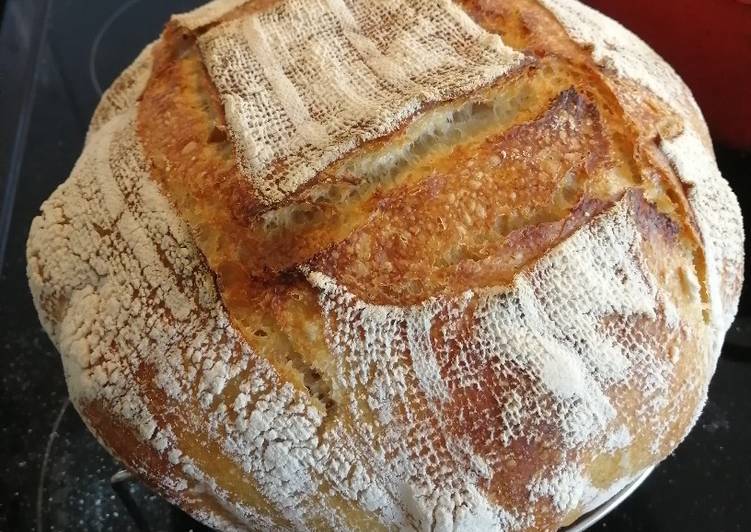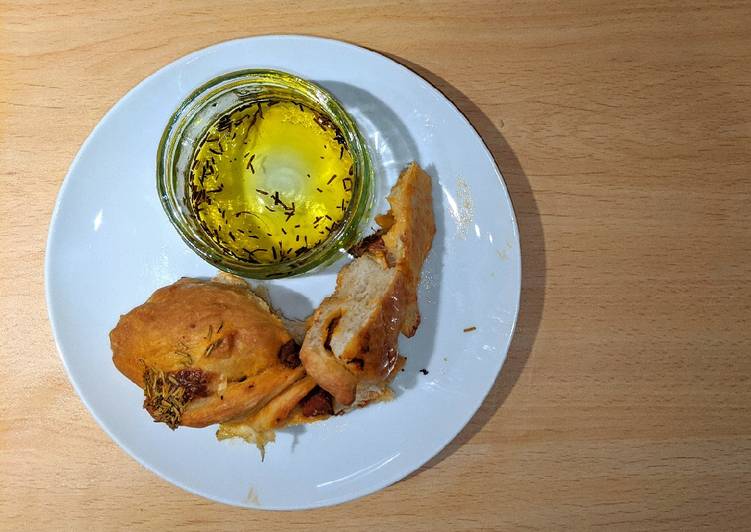
Hello everybody, it is me again, Dan, welcome to our recipe page. Today, we’re going to prepare a distinctive dish, sourdough bloomer. One of my favorites. This time, I’m gonna make it a bit unique. This will be really delicious.
Sourdough bloomer is one of the most popular of current trending meals in the world. It’s enjoyed by millions every day. It’s easy, it is fast, it tastes yummy. They’re fine and they look wonderful. Sourdough bloomer is something that I have loved my whole life.
A medium sliced D shaped sourdough bloomer, perfect for toast, sandwiches and premium breakfast dishes. Download high-quality Fresh crusty sourdough bloomer bread loaf images, illustrations and vectors perfectly priced to fit your projects budget. We show you how to make a sourdough loaf from scratch.
To begin with this particular recipe, we must first prepare a few ingredients. You can have sourdough bloomer using 5 ingredients and 10 steps. Here is how you can achieve it.
The ingredients needed to make Sourdough bloomer:
- Get bread flour
- Take kamut flour
- Take sourdough starter
- Prepare warm water
- Get water mixed with 10g salt
Love the aroma, taste, and texture of homemade bread? Photo about Sourdough loaf bread isolated on white background. This is a version of Robotchef's recipe posted in Dan Lepard's forum, but tweaked, and made sourdough. The taste is far superior using all leaven.
Steps to make Sourdough bloomer:
- In a large bowl, mix together the bread and kamut flour, the warm water and the sourdough starter, then cover with a hot wet cloth and leave to rest for 30 mins at room temperature, to allow all the ingredients to bond
- Add the salted water to the mixture and knead together. Adding the salt now will help tighten up the dough, allowing you to tuck the sides under to shape. Cover with a wet cloth and leave to rest for 30 mins at room temperature
- Now stretch and fold your dough, to let that gluten work and create some structure. To do so, grab a "corner" of your dough and gently pull it outward, stretching and waving it, then fold it on its own. Repeat until the edges all around the dough have been pulled and folded. Cover with a wet cloth and leave to rest for 30 mins at room temperature
- Repeat step 3 about 5-6 times, letting your dough rest for 30mins in between stretches. Then let it rest for at least 1-2 hours
- Now you can shape: get your dough on a floured surface, and pull it into a square. Now fold the corners in, in a cross stitch manner. Then fold it 4 times on its own: pull the bottom 1 third up, then the top 1 third down, and the left and right sides 1 third in. Turn your dough upside down, and start sliding it on the surface in order to tighten and seal the bottom. Let it rest a few seconds, to allow the dough to completely seal underneath
- Time for proofing: generously flour your proofing basket (or you can use a bowl lined with a dry, clean tea towel like I do) and tip your dough in it upside down. Cover and let it rest at room temperature for 1-2hours, then in the fridge overnight
- Once the dough has risen, preheat your oven at 220°, and leave your casserole or dutch oven in it to get really hot. Once you reached your temperature, flour the casserole or dutch oven, or line with a baking sheet, the tip the dough into it, and score the top of with a sharp knife. Cover with a lid and bake for 20 minutes. Leave a tray full of water in the oven during baking time, to allow extra moisture in
- After 20 minutes, remove the lid and bake for another 20 minutes
- Once the bread has cooked for 40 minutes, take it out of the oven and place on a cooling rack
- Once it's completely cold, slice it and go ahead enjoying it on its own or with some delicious butter 😊
My sourdough is a piece of bread dough that is enough to use for my next batch. Sourdough is trickier, and this recipe is quite minimalist: lots of ingredient ratios and timings should actually vary. When sourdough is left to rise, its characteristics change as it ferments. The dough's volume has How much sourdough starter or leaven has been used in the dough. It's always best to start with a really active sourdough starter.
So that is going to wrap this up for this special food sourdough bloomer recipe. Thank you very much for your time. I am confident you will make this at home. There is gonna be interesting food in home recipes coming up. Remember to save this page on your browser, and share it to your family, friends and colleague. Thank you for reading. Go on get cooking!

